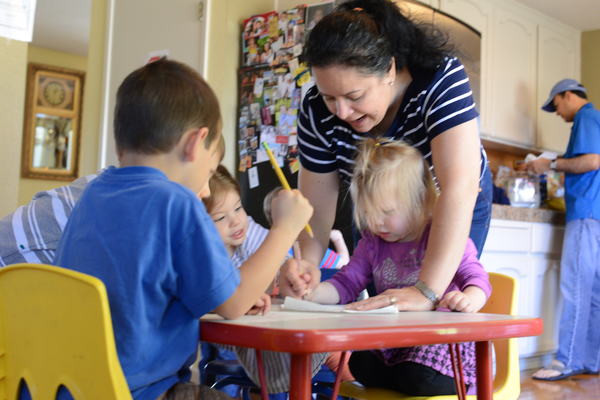Program Observations
A program observation can be an insightful part of a program’s continuous quality improvement efforts. Continuous quality improvement includes inviting program feedback and reflecting on your program practices to better meet the needs of the children and families that you serve. An outside observer (someone who doesn’t work in your program) can use an assessment tool to:
● Provide objective feedback about program practices
● Notice and describe program strengths and potential opportunities for growth
Observation and Assessment Tools
The Environment Rating Scale (ERS) is a program evaluation tool used to measure a child’s typical experience on a typical day. The tool includes information about the physical space, personal care routines, learning activities, interactions, and the structure of the day. There are tools specific to the setting of the program: Early Childhood Environment Rating Scale (ECERS-3) for center-based preschool programs, Family Child Care Environment Rating Scale (FCCERS-3) for home-based programs, and Infant/Toddler Environment Rating Scales (ITERS-3) for center-based infant/toddler classrooms. The Classroom Assessment Scoring System (CLASS) measures the effectiveness of interactions in an early learning program, both adult-child interactions and children’s interactions with each other. While both of these tools provide meaningful feedback for early childhood programs, the CLASS tool is best for use with one age group at a time
Who conducts the observations?
There is a team of trained and reliable Observation and Assessment Specialists at the Center on Early Learning Support and Innovations (CELSI) who are able to travel across Oregon and can conduct observations in English, Spanish, and Russian-speaking programs.
How can having an observation support my Spark journey?
● Standard AB5 evidence includes self-assessment and outside evaluation in order to set program goals. Having an observation performed by someone outside of your program is one way to show evidence for this standard.
● Programs receive a summary report with feedback about what was observed in order to support identifying program strengths and potential opportunities for growth.
Video 1: How to prepare for an observation
English
Spanish
Russian
Video 2: What to expect during an observation
English
Spanish
Russian
Would you like more information about on-site observation? Call or email the Assessment team at 1-877-768-8290 or assessment_team@mail.wou.edu

ERSI
The Environment Rating Scales Institute (ERSI) website provides information and resources about all the Environment Rating Scales (ERS) tools. Introductory videos, supplementary materials, and additional notes for the scales are available. These resources can help providers understand the tools and use them better.
For more information click below.
CLASS
Teachstone provides many resources to support the Classroom Assessment Scoring System (CLASS). Resources include training for teachers, observers, and coaches. Podcasts, blogs, and other materials can help providers improve the practices measured by the CLASS tools.
For more information click below.

What Others Say About Observation And Assessment
“Muchas gracias por sus comentarios.”
Thanks so much for the strength-based feedback! Teachers are excited to take this opportunity to improve their classrooms!
Thank you for coming out to see us at the Center. I appreciate the suggestions and ideas for growth in the classroom. I will be meeting with the team to discuss these and find ways to implement them in the classroom. Thank you!
Thank you for the feedback! Looking forward to scheduling the other 4 classrooms for observations!
Thank you for this feedback. We valued the experience.
We truly appreciate the time and the suggestions made for this great teaching team.

